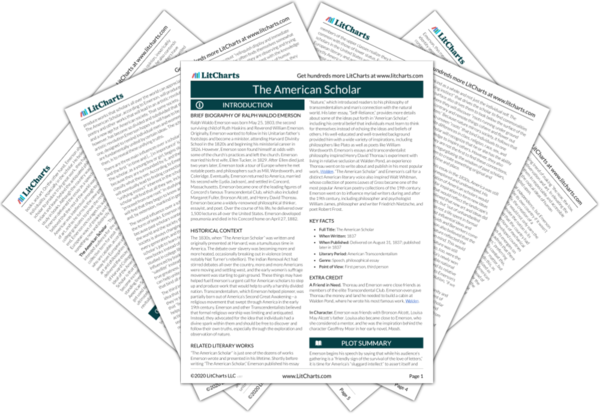
Welcome to the LitCharts study guide on Ralph Waldo Emerson's The American Scholar. Created by the original team behind SparkNotes, LitCharts are the world's best literature guides.
A concise biography of Ralph Waldo Emerson plus historical and literary context for The American Scholar.
Ralph Waldo Emerson was born May 25, 1803, the second surviving child of Ruth Haskins and Reverend William Emerson. Originally, Emerson wanted to follow in his Unitarian father’s footsteps and become a minister, attending Harvard Divinity School in the 1820s and beginning his ministerial career in 1826. However, Emerson soon found himself at odds with some of the church’s practices and left the church. Emerson married his first wife, Ellen Tucker, in 1829. After Ellen died just two years later, Emerson took a tour of Europe where he met notable poets and philosophers such as Mill, Wordsworth, and Coleridge. Eventually, Emerson returned to America, married his second wife (Lydia Jackson), and settled in Concord, Massachusetts. Emerson became one of the leading figures of Concord’s famous Transcendental Club, which also included Margaret Fuller, Bronson Alcott, and Henry David Thoreau. Emerson became a widely-renowned philosophical thinker, essayist, and poet. Over the course of his life, he delivered over 1,500 lectures all over the United States. Emerson developed pneumonia and died in his Concord home on April 27, 1882.
Get the entire The American Scholar LitChart as a printable PDF."My students can't get enough of your charts and their results have gone through the roof." -Graham S.

The 1830s, when “The American Scholar” was written and originally presented at Harvard, was a tumultuous time in America. The debate over slavery was becoming more and more heated, occasionally breaking out in violence (most notably Nat Turner’s rebellion). The Indian Removal Act had stirred debates all over the country, more and more Americans were moving and settling west, and the early women’s suffrage movement was starting to gain ground. These things may have helped fuel Emerson’s urgent call for American scholars to step up and produce work that would help to unify a harshly divided nation. Transcendentalism, which Emerson helped pioneer, was partially born out of America’s Second Great Awakening—a religious movement that swept through America in the early 19th century. Emerson and other Transcendentalists believed that formal religious worship was limiting and antiquated. Instead, they advocated for the idea that individuals had a divine spark within them and should be free to discover and follow their own truths, especially through the exploration and observation of nature.
“The American Scholar” is just one of the dozens of works Emerson wrote and presented in his lifetime. Shortly before writing “The American Scholar,” Emerson published his essay “Nature,” which introduced readers to his philosophy of transcendentalism and man’s connection with the natural world. His later essay, “Self-Reliance,” provides more details about some of the ideas put forth in “American Scholar,” including his central belief that individuals must learn to think for themselves instead of echoing the ideas and beliefs of others. His well-educated and well-traveled background provided him with a wide variety of inspirations, including philosophers like Plato as well as poets like William Wordsworth. Emerson’s essays and transcendentalist philosophy inspired Henry David Thoreau’s experiment with living in relative seclusion at Walden Pond, an experience Thoreau went on to write about and publish in his most popular work, Walden . “The American Scholar” and Emerson’s call for a distinct American literary voice also inspired Walt Whitman, whose collection of poems Leaves of Grass became one of the most popular American poetry collections of the 19th century. Emerson went on to influence myriad writers during and after the 19th century, including philosopher and psychologist William James, philosopher and writer Friedrich Nietzsche, and poet Robert Frost.
Key Facts about The American ScholarA Friend in Need. Thoreau and Emerson were close friends as members of the elite Transcendental Club. Emerson even gave Thoreau the money and land he needed to build a cabin at Walden Pond, where he wrote his most famous work, Walden .
In Character. Emerson was friends with Bronson Alcott, Louisa May Alcott’s father. Louisa also became close to Emerson, who she considered a mentor, and he was the inspiration behind the character Geoffrey Moor in her early novel, Moods .